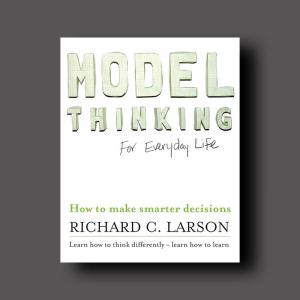
Operations Researcher Richard Larson Recently Featured on Close Up Radio
LEXINGTON, MA, UNITED STATES, January 21, 2025 /EINPresswire.com/ -- Our guest, who has appeared before on Close Up Radio, has earned a respect for improving the world in which we live. What makes him unique is that he accomplishes this by using a more logical and scientific mindset. With many successes to his credit, he now desires to share his approach with the general public. This is the story of Richard Larson.
Richard Larson has been an operations researcher for over five decades. His success in this area earned him the nickname “Dr. Queue”. “I have won all kinds of awards for my operations research over my decades of career,” Richard notes. In addition, he also describes himself as an “MIT Lifer.” In other words, besides being an alumnus of the Massachusetts Institute of Technology (MIT), he also is a tenured professor at MIT.
Operations research is the world’s most important, invisible profession,” explains Richard.
According to Brittanica, operations research (OR) is the “application of scientific methods to the management and administration of organized military, governmental, commercial, and industrial processes.”
“It’s bringing the scientific method to the world in which we live,” confirms Richard. In operations research, Richard utilizes a model thinking approach. “Operations research is also a fancy name for model thinking,” adds Richard.
Model thinking, according to Richard, has two definitions – “exemplary thinking, which is thinking to be emulated, such the term ‘model citizen’, and conceptual thinking, which is part of scientific research and mathematics.”
His knowledge and expertise have manifested itself in his most recent book, Model Thinking for Everyday Life: How to Make Smarter Decisions. Released in 2023, the book title has been carefully selected, so that it incorporates both meanings – exemplary and conceptual. The book features eleven chapters, designed to take the reader through a journey of what model thinking is, providing a myriad of examples, and opportunities to apply it.
For his upcoming show, Richard will discuss applications of operations research and model thinking in our everyday lives. Specifically, Richard will focus on the following areas: Traffic Lights, Airlines, GPS, and Car Maintenance.
Regarding traffic lights at intersections, they could run two ways – either on a fixed cycle or an adaptive cycle depending on the real time numbers of cars in queue. You can use operations research to optimize the duration of the cycle, and the ratio of green to red dependent on the traffic. As for most airlines, they use operations research to schedule their planes, personnel in their planes, passengers, and for weather-related incidents. As for the GPS map that you have in your car, it uses operations research known as Dijkstra's algorithm to give you the minimal travel time, from where you are to where you are going. When it comes to cars, operations research is useful in determining the maintenance schedule. If you maintain it according to your schedule, then you are less likely to incur the expense of any unplanned repairs on the car. It’s all about preventative maintenance.
Richard will also discuss how he applies operations research and model thinking in his own personal life. “Over the course of over twenty years, I gradually and informally incorporated operations research into my life,” Richard mentions.
“For instance, the first thing that I do in my day is to write an e-mail to myself,” he explains. “The e-mail is a model of how I think the day will progress, and what I should be doing. One item that I put in that e-mail includes the three walks that I have with my golden retriever. This of course includes personal errands. Most significant is when I go food shopping at Stop & Shop. The food in your pantry can be viewed as an operations research management problem that needs to have a solution. Food and other resources in the pantry need to be replenished in a timely manner.”
“How an average person can incorporate operations research is by using model thinking,” shares Richard. “You can apply this on different levels including what needs to happen today, and what needs to happen in the long-term. Having model thinking as part of your awareness and reflection can be quite important to people. People need to sit down reflect and plan out.”
“Let the problem do the talking!” Richard concludes. “Get your hands dirty! Get your feet messy!”
Close Up Radio recently featured Richard Larson in an interview with Jim Masters on Wednesday January 15th at 10am Eastern
Listen to the Podcast
https://podcasts.apple.com/us/podcast/close-up-radio-welcomes-back-operations-researcher/id1785721253?i=1000684224746
https://www.iheart.com/podcast/269-close-up-radio-242020413/episode/close-up-radio-welcomes-back-operations-258324730/
https://open.spotify.com/episode/5ry7sRBoGMcwdnBPV8nzCQ
You may purchase Richard Larson’s most recent book Model Thinking for Everyday Life on Amazon
Lou Ceparano
Close Up Television & Radio
+ +1 631-850-3314
email us here
Visit us on social media:
Facebook
Distribution channels: Book Publishing Industry, Education, Media, Advertising & PR, Science, Technology
Legal Disclaimer:
EIN Presswire provides this news content "as is" without warranty of any kind. We do not accept any responsibility or liability for the accuracy, content, images, videos, licenses, completeness, legality, or reliability of the information contained in this article. If you have any complaints or copyright issues related to this article, kindly contact the author above.
Submit your press release


